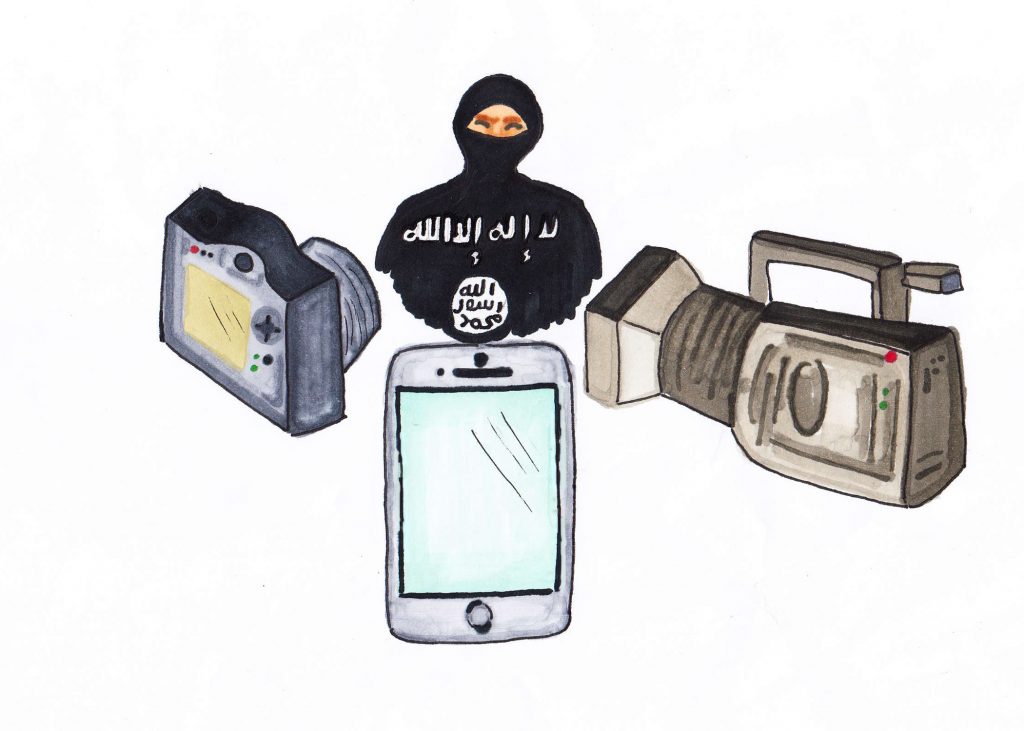On Nov. 13, 2015 the city of Paris experienced a calamitous attack from extremist malevolence. That day, 129 individuals lost their lives and an additional 352 were admitted to hospital care, many in critical state.

On Nov. 13, 2015 the city of Paris experienced a calamitous attack from extremist malevolence. That day, 129 individuals lost their lives and an additional 352 were admitted to hospital care, many in critical state. Since then, the bereaved victims have shown strength as retaliation, such as illuminating the Eiffel Tower in French colors.
However, the Islamic State of Iraq and Syria or ISIS, the group responsible for the attacks, have become the center of attention for popular news outlets, especially television broadcasts. While we must remain alert of any threat to our safety, media has focused on ISIS to such an extent that we are spreading the fear that they prey on.
Instead, they should emphasize on the strength that people, especially Parisians, show in the face of such terror, promoting our strength against the opposition.
A myriad of news outlets have discussed the threats ISIS has made, such as towards Times Square or Washington D.C.. Stories regarding the Paris attacks almost always focus on ISIS and their plots. The former two detail the most dangerous weapon at any terrorist’s disposal: fear. The primetime news outlets will all report on the topic to benefit their own network; however, such stories can serve as inadvertent propaganda for ISIS’ cause.
Consider your television being turned into multiple propagandist outlets, especially when a threatening video is what greets you. Such hysteria has been experienced before, such as the 9/11 attacks and the Second Red Scare, the former creating a great distrust of national security measures and the Middle Eastern states, the latter causing much internal turmoil within the United States regarding anti-Communism propaganda. The effect of news can manipulate public motives, and if such unpremeditated promotion of ISIS power, whether it be existent or not, were discussed to such an extent, a mass panic could once again ensue.
Yet, the power of media can be used to solidify our defiance to such malevolent groups. A CBS evening news story by Scott Petley demonstrates the power human spirit can have against terror, along with commemorating the Paris attacks without alluding to ISIS. Instead, the story delineates victim Antoine Leiris’ message to the attackers. “This little boy will insult you by being happy and free,” stated Leiris, a retort that exhibits strength and resilience, comparing the innocence of a child to its diametrical inverse. Moreover, omitting ISIS from the story withholds any publicity or pride that can be used to spread trepidation, instead reducing them to mere “killers,” repugnant individuals of anonymity.
Such stories are our weapon against the terrorist threat, promoting united fortitude opposed to mass delirium; reports that show our collaborative power over threats to stability will both intimidate the terrorists, yet motivate American, French, British and other societies to express their adamance for peace. Such measures have been used before in the form of more explicit propaganda, a popular example being World War II, invigorating nationalism to increase the war effort, calling individuals to action for their country.
This style of propaganda should not be mistaken as the aforementioned Red Scare, which spread xenophobia towards communist countries, not motivation for solidarity. With mass communication being so ubiquitous, such pride can be the key to increasing resistance to this zealous group.
However, that isn’t to say we should stop reporting directly on ISIS. It is imperative that we have knowledge of their actions, so long as it isn’t excessively released in a tremulous tone. Instead, key information to prevent future attacks and concise, cautionary notice of possible threats should be reported. An example of this would be the soda can method ISIS supposedly used to down a Russian airliner. The reveal of this technique shows the terrorists’ crave for attention, sharing information to generate terror. However, they also provided knowledge that can be used to counter similar plots that may occur. As long as reports are done in this lens, consumers can feel reassured of our intelligence while also not losing concept of the threat.
In the face of adversity, a united response can be the most effective, and with such a powerful tool as the media, the congregation against fear can be achieved. Thus, we should be alert of terrorists that threaten our safety, yet we should strive to show the greatest quality that cannot be purged by any force, especially those that feeds from hostility– our humanity.













